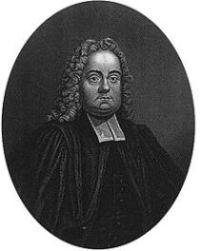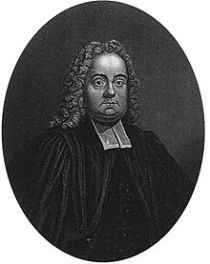7. Without any ruffle or disorder, he talks it over with Isaac, as if it had been but a common sacrifice that he was going to offer, v. 7, 8.
(1.) It was a very affecting question that Isaac asked him, as they were going together: My father, said Isaac; it was a melting word, which, one would think, would strike deeper into the breast of Abraham than his knife could into the breast of Isaac. He might have said, or thought, at least, “Call me not thy father who am now to be thy murderer; can a father be so barbarous, so perfectly lost to all the tenderness of a father?” Yet he keeps his temper, and keeps his countenance, to admiration; he calmly waits for his son’s question, and this is it: Behold the fire and the wood, but where is the lamb? See how expert Isaac was in the law and custom of sacrifices. This it is to be well-catechised: this is, [1.] A trying question to Abraham. How could he endure to think that Isaac was himself the lamb? So it is, but Abraham, as yet, dares not tell him so. Where God knows the faith to be armour of proof, he will laugh at the trial of the innocent, Job ix. 23. [2.] It is a teaching question to us all, that, when we are going to worship God, we should seriously consider whether we have every thing ready, especially the lamb for a burnt-offering. Behold, the fire is ready, the Spirit’s assistance and God’s acceptance; the wood is ready, the instituted ordinances designed to kindle our affections (which indeed, without the Spirit, are but like wood without fire, but the Spirit works by them); all things are now ready, but where is the lamb? Where is the heart? Is that ready to be offered up to God, to ascend to him as a burnt-offering?
(2.) It was a very prudent answer which Abraham gave him: My son, God will provide himself a lamb. This was the language, either, [1.] Of his obedience. “We must offer the lamb which God has appointed now to be offered;” thus giving him this general rule of submission to the divine will, to prepare him for the application of it to himself very quickly. Or, [2.] Of his faith. Whether he meant it so or not, this proved to be the meaning of it; a sacrifice was provided instead of Isaac. Thus, First, Christ, the great sacrifice of atonement, was of God’s providing; when none in heaven or earth could have found a lamb for that burnt-offering, God himself found the ransom, Ps. lxxxix. 20. Secondly, All our sacrifices of acknowledgment are of God’s providing too. It is he that prepares the heart, Ps. x. 17. The broken and contrite spirit is a sacrifice of God (Ps. li. 17), of his providing.





